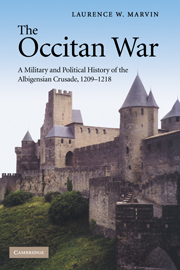In 1209, in what is now southern France, a war over heresy began. This war quickly mutated into a struggle over political control of the region, something its originator, Pope Innocent III, never intended. At the time the war began, this region was neither culturally nor linguistically French. Long after 1218 the region became known as “Languedoc,” for its people said “oc” to answer in the affirmative as opposed to those of the north who spoke Languedoϊl, oϊl being the Old French “oui.” In recent years historians, literature specialists, social scientists, and indeed people of the region itself have begun to refer to this territory as Occitania, another made-up name but one that is easy on the English tongue.
The heresy, whose adherents were called “Cathars” or “Albigensians” by their detractors, had co-existed alongside orthodox Christianity for over half a century in Occitania. Although the exact nature and origins of Catharism continue to be debated, the Cathars postulated a dual godhead, one of light and one of darkness. Heaven, the spiritual realm, and the human soul belonged to the god of light, while everything physical, including the bodies in which souls were trapped, belonged to the god of darkness. Cathars believed that by undergoing a rigorous purification ceremony known as the consolamentum, after death their souls escaped the physical world to reunite with God.
